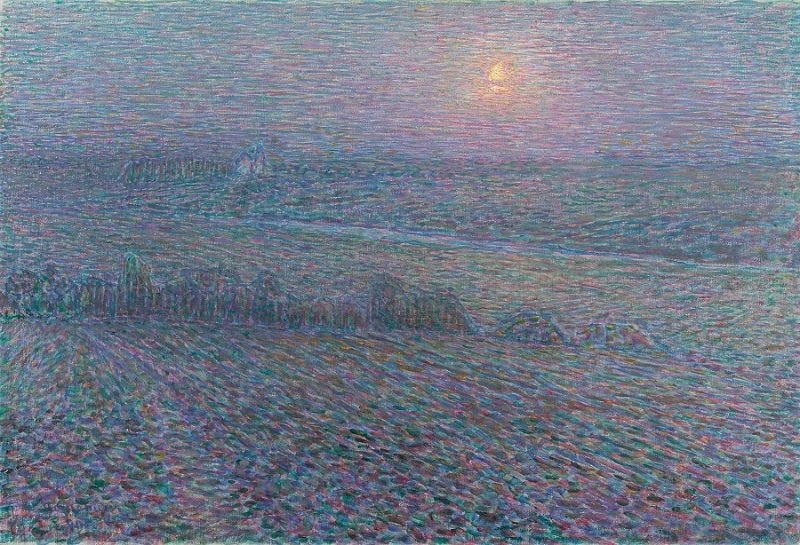Здравствуй.
Не так давно1 мне попалось стихотворение Владимира Маяковского (1894-1930) “Послушайте!”. We study Silver Age of Russian poetry in the final year at school (at least in my time) and this author is one of those I could not even read for awkwardness of poem lines. It was not poetry at all! Where is rhythm? Where is that easing the tension soft tapping on wooden table sound?

Now, after learning the period of Russian literature and art on 1900-1920s, I regard Mayakovsky as an acoustic horn endeavouring to reach out the hearts in time of upheaval.
After years, I returned to a collection of Mayakovsky poems and just glancing at it gave me another sense. So let’s read once again one of the most famous poems and learn some grammar.
Послушайте!
Ведь, если (1)звёзды зажигают —
значит — это кому-нибудь нужно?
Значит — кто-то хочет, чтобы они (2)были?
Значит — кто-то называет эти (3)плевочки жемчужиной?
(1) звёзды зажигают
Just like in English, we have a subject which supposedly must take first place in sentence. However Russian is flexible. So if you know the endings and how to conjugate2, the subject may be mentioned by the end of sentence.
However, what do we see here? Actually, not a pronoun is given and the main verb is not followed by any word that would recieve any quality from… oops it is placed right before. :) звёзды. Well, but is there a chance that we use verb without any subject (if you give an order or a recommendation, certainly)? Actually, yes. You can omit it because a verb’s ending reveals who and what it performs. ЗАЖИГА-ЮТ. The ending shows that the verb is of First conjugation: infinitive is зажигать. We can conjugate verbs in present and future tenses only. Ю means First pronoun — Я; я зажигаю. Here we have Т therefore — they. Они зажигают.
(2) были
The previous part of the sentence included a verb in present tense: кто-то хочЕТ. It just means someome wants it never stopped. Someone wants it to be.
- я хочу, чтобы лето не кончалось
I want the present wouldn’t change and stay in the same state
I don’t want summer to be over
- мне хочется, чтобы ты уже пришёл (наконец!)
I want it to have changed already, no longer can resist it.
I want you to be here already
(3) плевочки
whenever you see “чк” in nouns, it means a diminutive form of it.
плев-очк-и — suffix очк (diminutive) and ending и (plural form)
плев…. плевок which means “spit”
И, надрываясь
в метелях полуденной пыли,
(4)врывается к богу,
боится, что опоздал,
плачет,
целует ему (5)жилистую руку,
просит —
чтоб обязательно была звезда! —
клянётся —
(6)не перенесёт эту беззвёздную муку!
А после
ходит тревожный,
но спокойный наружно.
(4) врывается к богу
God must be written with a capital letter — Богу. Due to the Soviet regime, the rule was neglected because God doesn’t exist.
врываться к — because my action intrudes someone, one affects the other, therefore... Accusative case — кого? что? —> barge in
(5) жилистую руку
I highlighted it to show you how Mayakovsky wanted you to imagine God — a man with working hands, a gardener who knows sufferings, poverty and hunger.
a sinewy hand
(6) не перенесёт
It is usually used when someome has to cross over carrying something in hands, then we mean “to tranfer” or “to transport”. Also we carry a disease in body, and feelings&emotions. What does someone carry here?3
Говорит кому-то:
«(7)Ведь теперь тебе ничего?
Не страшно?
Да?!»
Послушайте!
Ведь, если звёзды зажигают —
значит — это кому-нибудь нужно?
Значит — это необходимо,
чтобы каждый вечер
над крышами
загоралась (8)хоть одна звезда?!
(7) ведь
This is such a part of speech that easily can be changed with ‘поэтому’, ‘так как’, ‘конечно’ etc. It is close to become old-fashioned but we still use it. Especially as “но ведь” — contradict to something\someone.
(8)хоть
Here we see that the number of something mentioned because it is needed, essential. It was added to emphasize that “at least” one is lit.
Another way when you use it refers that something is done depite of something:
хоть ты увидел, а то больше никто не заметил
If you want to support my project, you can do it here financially.
It’s just one cup of good herbal tea.
After a brief explanation of some bits, have a look at the poem in Russian and English here. Let me know what meaning Mayakovsky wanted us to learn?
А теперь,
до следующего письма!
Не так давно — recently
you conjugate\спрягать (спрягать — соединять\join) verbs
and conjugate\склонять (склонять — вести к\lead to) nouns
мУка — suffering, pain, or agony



